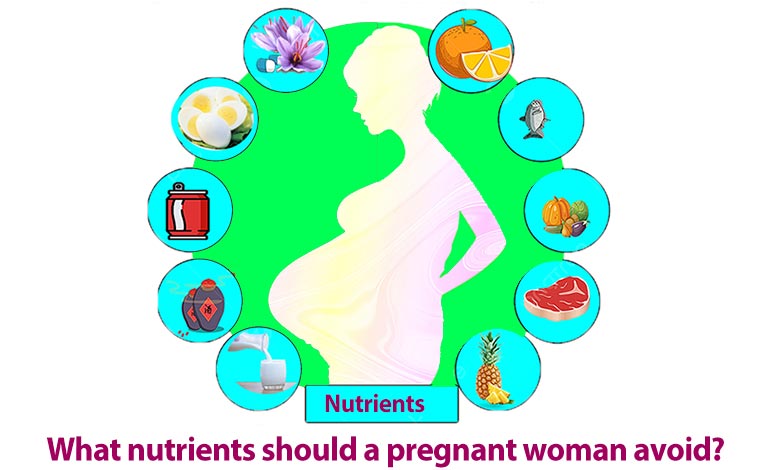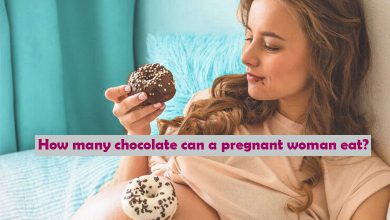What nutrients should a pregnant woman avoid?

Foods and beverages to avoid during pregnancy are a big concern for pregnant women because they require extra nutrients that can come from these foods. What should you eat or drink during pregnancy, and which foods should be avoided?
It is recommended that pregnant women avoid foods containing high amounts of saturated fat and sugar. These nutrients can affect the development of a woman’s infant.
Which food is prohibited during pregnancy?
There are some foods and beverages you should not consume at all during pregnancy. Perhaps the most important thing to remember is that there really is no one-size-fits-all diet for pregnant women since every woman’s nutritional needs are different. However, there are certainly some foods and beverages that should be avoided until after pregnancy.
Related article: What fruits are useful for pregnancy?
1-Saffron
Especially during early pregnancy, it can cause bleeding and separation of developing sperm and miscarriage. It is best not to use saffron during pregnancy.
2- fish
Fish is a nutritious part of a healthy pregnancy diet, but you should limit how much tuna, mackerel, and swordfish you eat during pregnancy. These fish contain high levels of mercury which can harm your baby’s developing brain. Limit these types of high-mercury fish to six ounces per week (two average meals).
Eating more than this amount has been shown to cause delays in your baby’s growth and development. In addition to limiting your intake of these higher-mercury fish, it is also important that you choose low-mercury alternatives like salmon and shrimp.
Related posts: Dos and don’ts of working during pregnancy
Fish with high mercury during pregnancy
During pregnancy, some types of fish should be avoided because they may contain mercury. Mercury is a toxic metal that can seriously damage a developing baby’s nervous system. This means not all fish are okay to eat during pregnancy!
3- Undercooked or raw fish
If you love sushi, make sure that it’s been fully cooked. Raw fish can carry bacteria like listeria and toxoplasmosis, which can be harmful to your baby. You may also want to limit other types of raw fish and shellfish since they can also harbor harmful bacteria that are not killed by freezing.
4- pineapple during pregnancy
When a food is said to trigger contractions or even labor, you may worry that it may trigger premature labor or that it is one of the foods pregnant women should avoid.
5- Undercooked, raw, and processed meat
Always cook meat, poultry, and eggs to a safe internal temperature. Make sure that the meat is cooked all the way through, and don’t eat raw or undercooked meats or eggs.
6- Raw eggs
Raw eggs can contain salmonella, which can lead to food poisoning. Avoid eating undercooked or raw eggs and foods made with them, such as homemade mayonnaise, Hollandaise sauce, and ice cream.
7- Organ meat
Organ meat is a great food to get your daily dose of vitamin A, which is critical for immune system health. But be sure to cook it thoroughly, as it can carry bacteria that cause listeriosis, which can lead to miscarriage or birth defects in the infant.
8- Caffeine
During pregnancy, you should avoid too much caffeine since a growing fetus is highly susceptible to its effects. The research on caffeine during pregnancy is conflicting.
Some studies have found that caffeine may be associated with low birth weight and premature delivery, but other studies have not found this association.
9- Raw sprouts
Cooked sprouts are safe to eat during pregnancy, but raw sprouts can contain a bacteria called E. coli. And that’s something you don’t want to mess with during pregnancy or any other time in your life because this nasty bacteria causes severe diarrhea, stomach cramps, and vomiting.
Edible sprouts, such as alfalfa and clover, are a major source of salmonella. This is due to the fact that they are grown in warm, moist environments that make it easy for bacteria to thrive.
10- Unwashed produce
Avoid foods that were grown or harvested using pesticides. Use a different type of product for each meal so you can wash them all well before eating.
You want to be sure to wash everything you buy with cold water and soap. If you forget to do this before cutting your fresh produce, wash it again before you eat or cook it.
11-Unpasteurized milk
Unpasteurized milk can contain harmful bacteria that can cause illness in both you and your baby. you should not drink unpasteurized milk during pregnancy.
12- Unpasteurized cheese
Many foods are safe to eat during pregnancy. However, some foods and beverages should be avoided. Unpasteurized milk is one example of a food that causes food poisoning during pregnancy.
13- Unpasteurized fruit juice
Unpasteurized fruit juice can contain listeria monocytogenes and other harmful bacteria. It can also contain germs that may cause food poisoning, such as E. coli and salmonella. And if you have a weak immune system, these bacteria could trigger symptoms of food poisoning, such as vomiting and diarrhea.
14- Alcohol
Since alcohol consumption during pregnancy increases the risk of stillbirth and miscarriage, it is advised to completely abstain from it. The brain development of your baby can be adversely affected by even a small amount of Trusted Sources.
Fetal alcohol syndrome, which can result from alcohol consumption during pregnancy, can also result in facial deformities, heart defects, and intellectual disability.
It is advised to abstain from alcohol altogether because there is no proven safe alcohol intake level during pregnancy.
15- Processed junk foods
There is no better time than during pregnancy to begin eating foods that are high in nutrients to benefit both you and your developing baby. Protein, folate, choline, and iron are just a few of the essential nutrients you’ll need to consume more of them.
The idea that you are “eating for two” is also untrue. You can continue to eat as you normally would during the first semester, then increase your calorie intake by about 350 calories per day during your second trimester and by about 450 calories per day during your third trimester.
Whole foods with plenty of nutrients to meet the needs of both you and the unborn child should make up the majority of an ideal pregnancy diet. Processed junk food typically contains few nutrients and is high in calories, sugar, and added fats.
Despite the fact that some weight gain is necessary during pregnancy, excessive weight gain has been linked to a number of issues and illnesses. Among them are a higher chance of developing gestational diabetes and complications during pregnancy or childbirth trusted source.
Keep your meals and snacks focused on protein, fruits and vegetables, whole grains, beans, and starchy vegetables that are high in fiber. There are many tasty ways to incorporate vegetables into your meals, so don’t worry.
Related posts: Vaginal discharge during pregnancy
the final conclusion.
It’s important to stay away from foods and drinks that could harm you or your unborn child while you’re pregnant.
While the majority of foods and drinks can be consumed without any problems, some, such as raw fish, unpasteurized dairy products, alcohol, and high mercury fish, should be avoided.
In addition, certain foods and drinks like coffee and those with a lot of added sugar should be avoided to support a healthy pregnancy.
Check out this article on healthy eating during pregnancy to find out more about the foods you should eat while pregnant.
